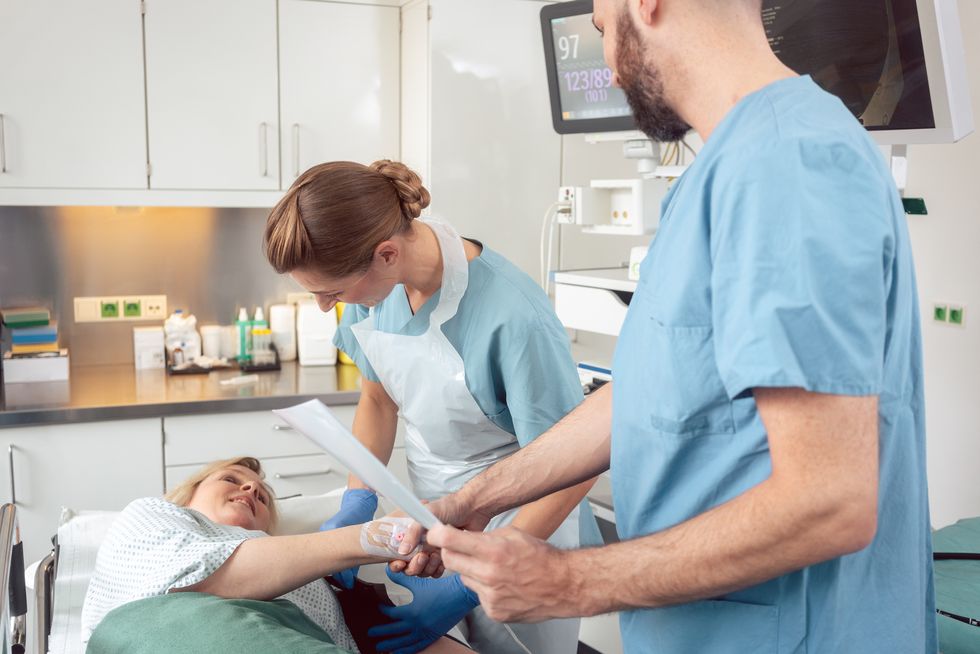Dear HealthyWomen,
I'm only 40 but am becoming aware of colon cancer as I hear more and more stories of younger people getting diagnosed with it. Added to that, I have a family history of the disease.
I wonder, am I too young to get a colonoscopy?
Signed,
Unsure and Afraid
Dear UAA,
Yes, it's true: Colon cancer has become a reality for many people younger than 50, which was, until recently, the age we were advised to start getting screened. In fact, people under 50 are the only group whose incidence of colon cancer is growing. They now comprises 11% of all colon cancer diagnoses.
Since 1994, there's been a 51% increase in colorectal cancer among those under age 50, according to the American Cancer Society. Overall, rates are highest in the south, and investigators found that the rates have risen for faster for rectal tumors than for colon tumors.
And it's not just the U.S. that is seeing diagnoses at earlier ages. The incidence is also rising in countries like Denmark, New Zealand, Australia and the United Kingdom.
The American Cancer Society changed its screening guidelines in 2018. It now recommends that screening begin at age 45 for people at average risk.
Not only are more younger people in their 30s and 40s getting diagnosed with colon cancer, but more are dying from it. In many cases, colon cancer in younger patients tends to be more aggressive. It also has a higher mortality rate among younger people because they typically take longer to get diagnosed, either because they're slow to recognize their symptoms or their healthcare professionals don't associate their symptoms with colon cancer because of their young age.
Why this troubling rise? Though researchers aren't totally sure why the incidence is rising in younger people, they do know certain things that contribute to the overall risk of colorectal cancer:
- Family history (although most younger-onset cases have no family history)
- A genetic link (like Lynch syndrome, which raises your risk for certain cancers)
- Lack of exercise
- Diets high in red meat
- Smoking
- Alcohol
- Obesity
- Environmental exposures
- Antibiotic use early in life
Be on the lookout for these symptoms, which are the most common signs of colorectal cancer in young people:
- Blood in your stool
- Bleeding from the rectum (with bright red blood)
- Abdominal cramping or pain
In addition, symptoms might include a change in bowel habits (diarrhea, constipation or narrowing of the stool) lasting for more than a few days; weakness and fatigue; unintended weight loss; or feeling like you need to have a bowel movement (even though you've already had one).
While it's true that many of these symptoms can be the sign of something else — like hemorrhoids, infection or irritable bowel syndrome — don't hesitate to contact your healthcare professional if you're experiencing them.
Here's more information about tests you might have to help rule out colon cancer.
Testing is the key to prevention, and treatment is most likely to succeed when the disease is caught early. Another key to prevention is a good, healthy lifestyle, which should include limiting your consumption of red meat, getting enough exercise, avoiding overweight and obesity and consuming alcohol moderately, if at all.
- 10 Things Every Woman Should Know About Colon Cancer - HealthyWomen ›
- Fast Facts: What You Need to Know About Colorectal Cancer Screening - HealthyWomen ›
- Colorectal Cancer 101 - HealthyWomen ›
- Navigating a Colorectal Cancer Diagnosis - HealthyWomen ›
- My Symptoms Were Dismissed as Hemorrhoids, but I Had Colon Cancer - HealthyWomen ›
- My Doctor Dismissed My Colon Cancer Red Flags as Normal Pregnancy Symptoms - HealthyWomen ›
- Meg Gets a Colonoscopy - HealthyWomen ›
- An ER Trip for My Shoulder Led to a Colon Cancer Diagnosis - HealthyWomen ›
- As a Mom, I Always Put My Needs Last – Until Stage 4 Colon Cancer Showed Up - HealthyWomen ›
- Como madre, siempre puse mis necesidades al último, hasta que apareció el cáncer de colon de etapa 4 - HealthyWomen ›
- The Connection Between Young Adults and Colon Cancer - HealthyWomen ›
- La conexión entre adultos jóvenes y el cáncer de colon - HealthyWomen ›






